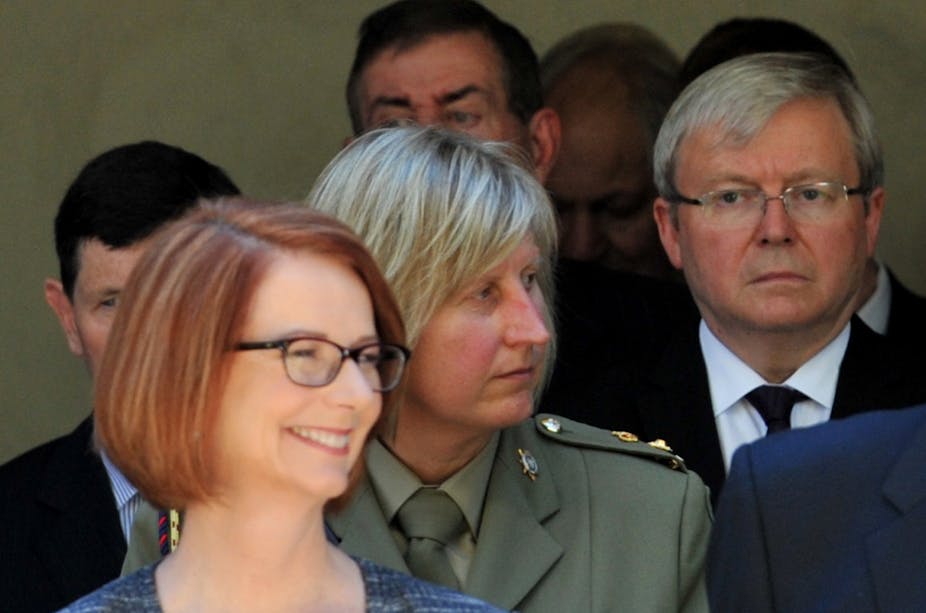There’s something a little thrilling about a bit of leadership biffo. However, when such talk shows little sign of abatement, as it has in respect to Gillard’s leadership of the ALP, then the thrill factor can plummet very quickly.
Labor’s heavy defeat at the Western Australian state election last week has continued to fuel speculation about the federal leadership. The resumption of discussion should come as no surprise, just as Labor’s loss in Western Australia was hardly a shock. Labor’s drubbing was widely predicted by psephologists and by the polls.
What is astonishing, however, is that some Labor politicians, including a former senior WA state Labor minister, persist with promoting the view that the only way that Labor will be able to avoid an electoral routing on 14 September is for Gillard to fall on her sword and quit the leadership.
If there is one lesson that ALP should have learnt from Rudd’s axing in 2010 is that terminating a leadership, whether by force or by agreement of the outgoing leader, can have lasting unintended consequences.
Voters believed that it was their right to cast final judgement on Rudd’s leadership. But the decision by caucus to oust Rudd denied the electorate this opportunity, even if it is the privilege of the party room in practice.
This fateful action by Labor’s caucus has created more problems for the party than it assuaged. The speed and clinical nature of the coup, not to mention the image of a teary Rudd announcing his exile to the backbench, shocked and offended many.
The circumstances of events ultimately served to portray Rudd as a victim of a gang “faceless men” and one ambitious redhead. In one foul swoop, the ALP rehabilitated Rudd in the eyes of an electorate who, up until this point, were fast losing patience with him.
More importantly, it set Gillard’s leadership off to a less than inglorious start. It tarnished her credibility deeply and has since served as the lens through which all subsequent judgements about her actions have been assessed.
While the most recent Newspoll once again shows that Rudd is more popular than Gillard among voters (particularly Coalition supporters), Rudd’s personal popularity is unlikely to offer a quick fix to Labor’s malaise. A change in the leadership is not the solution to a problem that has much deeper roots.
Nor can Labor’s problems be sheeted home to a failure to make plain to the electorate about what it stands for and who it represents. Like it or loathe it, believe it or not, Labor’s central message is unrelentingly clear; it supports “working Australians”.
Organisational reform, while a meritorious objective, is also unlikely to offer any real solution to the party’s present woes. If we accept that power tends to centralise, then efforts to temper the influence of existing factions within the organisation are only likely to impede or inconvenience them momentarily or displace them in favour of some new power clique.

While the circumstances of Rudd’s garroting sowed the seeds of ill-will, the problem has been compounded by Labor’s incredibly ambitious policy agenda. Gillard and her cabinet are, if nothing else, potentially guilty of policy over reach. In trying to do too much too quickly, Labor has struggled to retain control over its own agenda. Labor may have fared better if its approach to policy was a little less blitzkrieg and a little more ninja stealth.
One of the consequences of its frenetic policy making is that it has reinforced the perception of a big spending Labor government.
The only real solution available to Labor is to let the next election run its natural course with Gillard at the helm.
For ALP members sitting in marginal seats, this advice is easier to give than it is to receive.
This is not to suggest that Labor should be defeatist and assume the race is necessarily lost. Nor is it to suggest that Labor cannot turn things around. But what Labor does need to do is to show the electorate that it is willing to act with integrity; that it is prepared to take its lumps. Fundamentally, Labor must show that the means of government are just as important as the ends.
Caucus should allow Gillard to ride it out. If the brand is as damaged as everyone is inclined to think, then it is important to allow the electorate to cast its verdict on Gillard and the whole sordid Rudd affair so that both voters and Labor can move on.
Opposition, while never desirable for the main parties, can also provide opportunities to rebuild. Sometimes, in order to win the war, you must be prepared to lose the battle.

